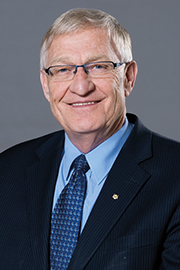New government focuses on “reducing the cost of doing business,” the new minister of ag says
By Andrea Gal
Managing Editor, Integrated Media
Ontario’s new minister of ag minced no words in a short discussion on cap and trade.
It “was just another place where the government’s hand was in the pockets of the citizens taking money out. … (Cap and trade) had nothing to do with reducing the carbon footprint,” Ernie Hardeman said in an interview with Farms.com on Friday.

The costs of the regulations extended beyond gasoline, he added. “Everything you buy includes part of the cost of cap and trade.”
The decision, officially enacted last Tuesday, aligns with the new government’s broader focus on “reducing the cost of doing business,” Hardeman said.
The minister could not provide details on the future of programs previously funded under cap and trade, such as GreenON Agriculture, at the time of the interview.
Premier Ford’s new cabinet is also targeting red tape.
When asked about the government’s top priorities, Hardeman stressed farmers “are spending far too much time in the office filling out forms rather than feeding the cattle and doing the work on the farm.” The government wants to “get rid of some of the red tape that was holding (farmers) back.”
AgMedia photo